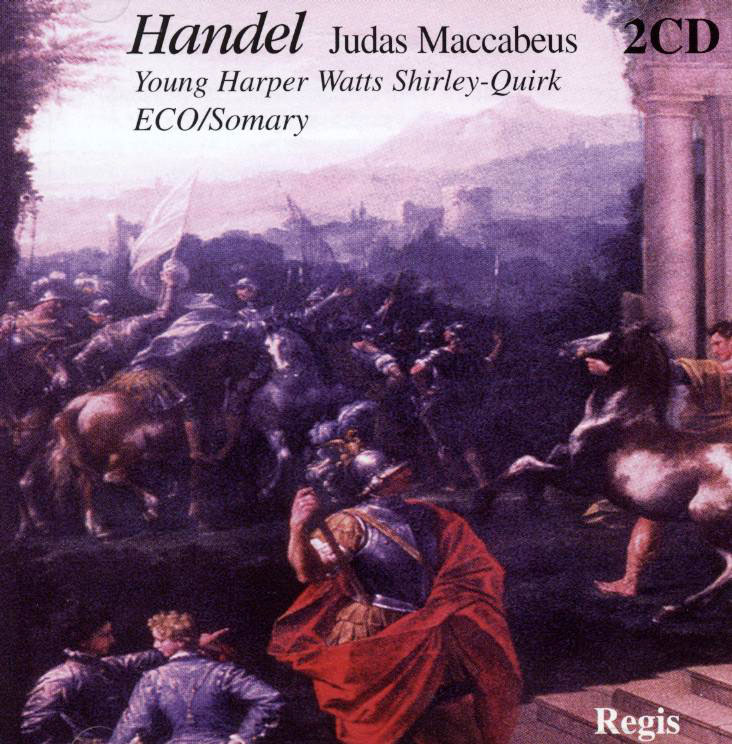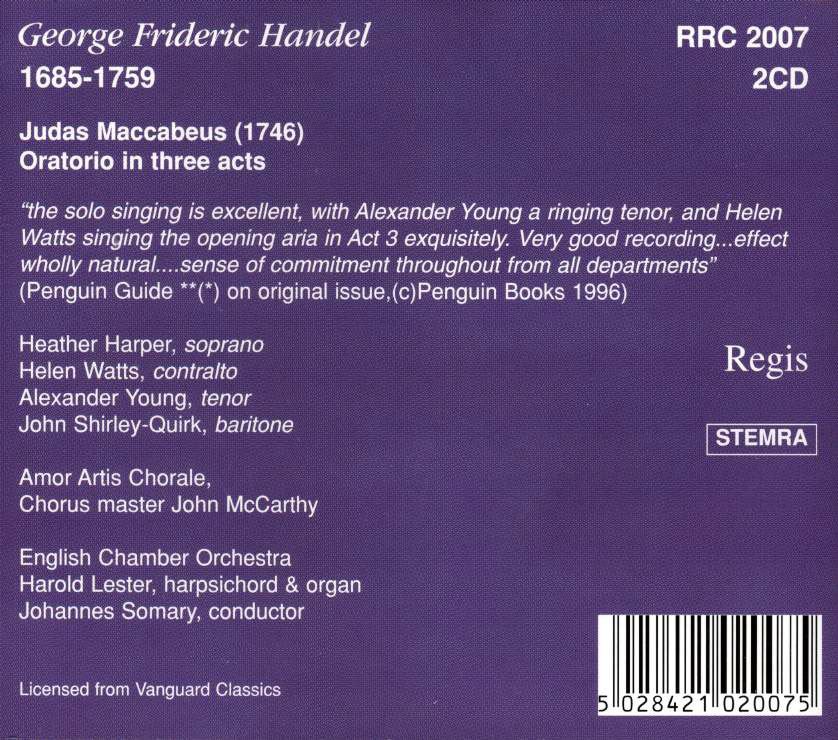Logowanie
Dziś nikt już tak genialnie nie jazzuje!
Bobby Hutcherson, Joe Sample
San Francisco
SHM-CD/SACD - NOWY FORMAT - DŻWIĘK TAK CZYSTY, JAK Z CZASU WIELKIEGO WYBUCHU!
Wayne Shorter, Freddie Hubbard, Herbie Hancock, Ron Carter, Elvin Jones
Speak no evil
UHQCD - dotknij Oryginału - MQA (Master Quality Authenticated)
Chesky! Niezmiennie perfekcyjny
Winylowy niezbędnik
ClearAudio
Double Matrix Professional - Sonic
najbardziej inteligentna i skuteczna pralka do płyt winylowych wszelkiego typu - całkowicie automatyczna
HANDEL, Elizabeth Watts, Heather Harper, Alexander Young, English Chamber Orchestra, Johannes Somary
Judas Maccabeus

- Elizabeth Watts - soprano
- Heather Harper - soprano
- Alexander Young - tenor
- English Chamber Orchestra - orchestra
- Johannes Somary - conductor
- HANDEL
Since his arrival in England in 1710 George Frideric Handel (1685 - 1759) had been a dominant figure in the musical life of his adopted country. His operas had been hugely popular in London up to c1728, before the onstage antics of rival prima donnas Cuzzoni and Bordoni, his own rivalry with fellow-composer Bononcini, and the huge success of Gay's Beggar's Opera all conspired to make his operas fall out of favour. His works for state occasions such as the coronation anthem Zadok the Priest (1727) and the suitably grave The ways of Zion do mourn (following the death of Queen Caroline in 1737) were justly famous. His works have remained popular probably due to their effective scoring and mixture of styles, for Handel was able to incorporate German profunditity, Italian melody and English intensity into his music as and when the occasion demanded. During the 1730s he found a ready audience for his oratorios that were admired as much for their theatricality as for their sentiment. By 1745 however there was a tailing off of interest in these works and audiences were diminishing. Handel's health in addition was suffering and he left London to recuperate. That summer he began work on a new piece Judas Maccabeus but shelved it temporarily in order to complete an Occasional Oratorio, a piece of largely recycled music designed to spur on the loyalists in their war against the Jacobite Bonnie Prince Charlie, whose forces had advanced as far south as Derby. The bloody battle of Culloden in April 1746 ensured victory against the Pretender and Handel felt able to recommence work on Judas Maccabeus, finishing it in August 1746. The topicality of the subject was not lost on the English and the piece was a storming success with numerous further performances given, many of them conducted by the composer himself. To follow the scenario it is necessary to know something of the events in Jerusalem in 169BC when the invading Syrian army sacked the Temple and suppressed the Jewish religion. Under their leader Mattathias the Jews embarked on a fiery resistance and by the time of Mattathias' death in 161 BC they had succeeded in partially driving back the Syrians. The oratorio begins with the funeral procession of the late leader. Mattathias' son Simon attempts to rouse the Israelites out of their grief "Arm, arm ye brave" suggesting that they choose his warlike brother Judas as Mattathias' successor. Judas wastes no time in dramatically inspiring the Israelites in his bravura-like aria "Call forth thy powers, my soul". Four contrasting arias praying for liberty from the Syrian yoke follow before the warlike theme returns to close the first act. Act Two opens with a dramatic celebration of victory for the Jews, but in the midst of their partying and acclamation of Judas, a messenger brings word of renewed threat of war as the Syrian king Antiochus has sent his `valiant Gorgias, and commands his proud, victorious bands to root out Israel's strength, and to erase ev'ry memorial of the sacred place'. Once again the hopes of the chorus led by an Israelite woman descend to new depths but in his famous aria "The Lord worketh wonders his glory to raise" Simon again revives their spirits and the Israelites reaffirm their faith in God's power. One of handel’s greatest gems opens the last act: the priest’s aria “Father of Heaven" as he prays for a decisive Jewish victory. As if in answer to his prayers a messenger announces a huge defeat for the Syrians at Capharsalama and the triumphant Judas returns to the strains of "See the conqu'ring hero comes". Furthermore Judas introduces the Roman ambassador who brings a promise of protection for Jerusalem against further attack. With this peaceful prospect before them the Israelite woman sings the justly famous air "0 lovely peace, with plenty crown'd" before Simon and the chorus bring the piece to a joyous conclusion. The work as heard today has changed somewhat over the years. In fact, Judas although an instant success, underwent some immediate changes as Handel was encouraged to add to his already large-scale oratorio with extracts from other works, including "See the conqu'ring hero" from Joshua (1750). This recording, originally on Vanguard, dates from 1971 and is one of a series of recordings (including Theodora, The Messiah and extracts from St Matthew Passion) by the Swiss-born Baroque specialist Johannes Somary, now based in New York and Connecticut.As ever he uses a formidably versatile line-up of singers: Helen Watts and John Shirley-Quirk, both much in demand as recording artists, and Heather Harper, who was by this time well-known abroad, having sung with great acclaim at Bayreuth. Alexander Young was one of the finest post-war tenors equally at home in Baroque music, Viennese operetta and twentieth century opera (The Rake's Progress, Saul and David and The Bassarids). (c)James Murray 2000


































